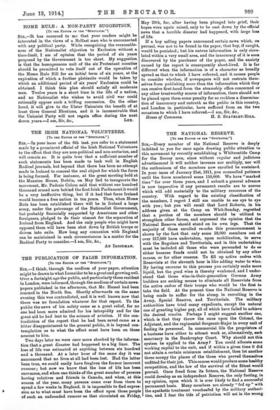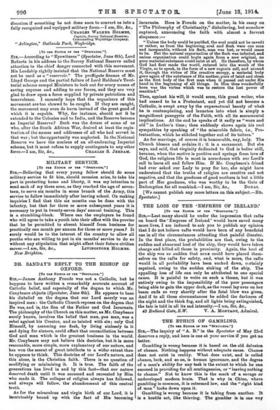THE NATIONAL RESERVE. LTD Ter Emus or Tar ..Srsorrros."] Sts.,—Every
member of the National Reserve is deeply indebted to you for once again drawing public attention to this movement by recently establishing a Whitsuntide Camp for the Surrey men, since without regular and judicious advertisement it will neither increase nor multiply, nor will the enthusiasm of the members now enrolled be sustained. In your issue of January 21st, 1911, you counselled patience until the force numbered some 150,000. We have "marked time" for over three years, and I submit a general advance is now imperative if any permanent results are to accrue which will add materially to the military resources of the country. With regard to the existing classification of the members, I regret I still am unable to see eye to eye with you; but you will recall that Lord Roberts, in his address given at the Camp on Whit-Sunday, regretted that a portion of the members should he utilized to strengthen other forces, and expressed the opinion that the National Reserve should stand on its own legs. That the majority of those enrolled re-echo this pronouncement is shown by the fact that. only some 58,000 members out of over 217,000 have undertaken, upon mobilization, to serve with the Regulars and Territorials, and in this undertaking must be included an those who were persuaded to do so either because funds could not be obtained by any other means, or for other reasons. To fill up active cadre, with Reservists at the eleventh hour is like adding water to wine. By having recourse to this process you certainly make more liquid, but the good wine is thereby weakened, and I under- stand that those wise-in-their-generation German Army builders are seeking means to eliminate all Reservists from the active cadres of their troops who would be the first to take the field. At the present time the National Reserve is being made to suffer for the slump in recruiting in the Army, Special Reserve, and Territorials. The military authorities have tried many expedients, except the natural one of granting higher pay, all of which have failed to achieve the desired results. Perhaps I might suggest another one, which is that they throw the onus upon the Colonel, the Adjutant, and the regimental Sergeant-Major in every unit of finding its personnel. In commercial life the proprietors of a business have either to attract work or, alternatively, seek sanctuary in the Bankruptcy Court. Why should not this system be applied to the Army P You could allocate some working capital to the unit, and if within a given time it did not attain a certain minimum establishment, then let another three occupy the places of the three who proved themselves unfitted for their job. This course would produce some healthy competition, and the law of the survival of the fittest would prevail. Once freed from its fetters, the National Reserve could develop as an independent. Reserve, the only footing, in my opinion, upon which it is ever likely to find a successful permanent. basis. Many members are already "fed up " with the apathetic treatment vouchsafed by the military authori- ties, and I fear the tide of patriotism will set in the wrong direction if something be not done soon to convert us into a fully recognized and equipped military force.—I am, Sir, &c.,
Crtaarats WALKER HOLMES,
Captain, Surrey National Reserve; Commanding Weybridga Company.
" Arlington," ()attends Park, Weybridge.











































 Previous page
Previous page